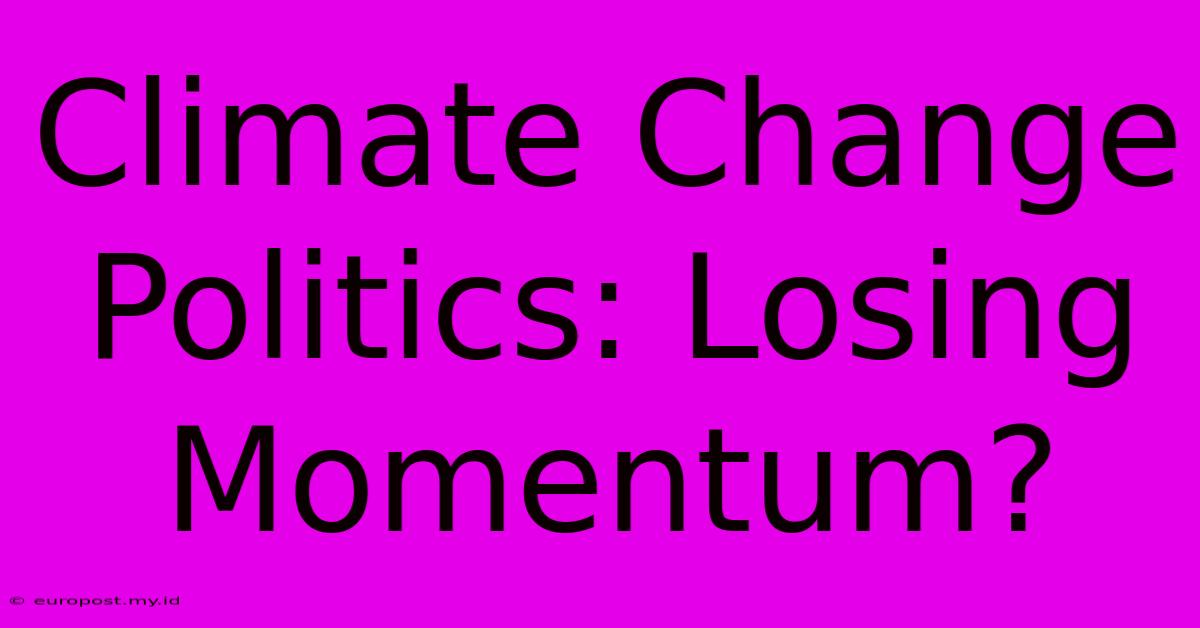Climate Change Politics: Losing Momentum?

Discover more in-depth information on our site. Click the link below to dive deeper: Visit the Best Website meltwatermedia.ca. Make sure you don’t miss it!
Table of Contents
Climate Change Politics: Losing Momentum?
The fight against climate change is arguably the defining political challenge of our time. Yet, despite mounting scientific evidence and increasingly visible effects, the global response feels, at times, sluggish and fragmented. Is the political momentum behind climate action waning? This article explores the complexities of climate change politics, examining the factors contributing to perceived setbacks and analyzing the potential pathways towards renewed global cooperation.
The Shifting Sands of Political Will
The political landscape surrounding climate change is constantly shifting. While ambitious targets and agreements like the Paris Agreement represent significant progress, their implementation has proven far more difficult. Several factors contribute to this:
1. National Interests vs. Global Cooperation:
National interests often trump global collaboration. Countries prioritize their economic growth and energy security, sometimes at the expense of ambitious climate commitments. This is particularly evident in nations heavily reliant on fossil fuels, where transitions to renewable energy sources face significant economic and social resistance. Balancing economic development with environmental protection remains a major hurdle.
2. Political Polarization and Disinformation:
Climate change has become increasingly politicized, with deep divisions existing within and between countries. This polarization fuels disinformation campaigns that sow doubt about the severity of climate change and the effectiveness of proposed solutions. The resulting public confusion and lack of consensus hamper the implementation of effective policies.
3. The Short-Term vs. Long-Term Focus:
Climate change is a long-term problem requiring long-term solutions. However, politicians often prioritize immediate concerns and short-term electoral cycles, making it difficult to secure sustained investment and commitment to climate action. The perceived economic costs of immediate action frequently outweigh the long-term benefits in the minds of policymakers.
4. Unequal Burden Sharing:
Developed nations bear a historical responsibility for greenhouse gas emissions, yet developing countries are often disproportionately affected by climate change impacts. Negotiating equitable burden-sharing arrangements, ensuring financial and technological support for developing nations' climate mitigation and adaptation efforts, remains a critical point of contention.
Renewing Momentum: Pathways to Progress
Despite these challenges, it is crucial to avoid despair. Several factors offer hope for renewed momentum:
1. The Growing Power of Public Opinion:
Public awareness of climate change is increasing, driven by increasingly visible effects like extreme weather events and rising sea levels. This growing public pressure is forcing politicians to take climate action more seriously. Youth-led movements have played a vital role in amplifying these voices.
2. Technological Advancements:
Technological advancements in renewable energy, energy storage, and carbon capture are making climate-friendly solutions more affordable and accessible. This technological progress reduces the perceived economic barriers to climate action.
3. The Rise of Climate Finance:
While still insufficient, there's a growing commitment to climate finance – the provision of financial resources to support climate action in developing countries. Increased investment in green technologies and climate adaptation measures is crucial for fostering global cooperation.
4. Increased Corporate Engagement:
More and more corporations are acknowledging the risks of climate change and embracing sustainability initiatives. This growing corporate engagement is driving innovation and creating economic opportunities in the green economy.
Conclusion: A Race Against Time
The fight against climate change is far from over. While political momentum may have faced setbacks, the urgency of the problem remains undeniable. Renewed global cooperation, driven by public pressure, technological innovation, increased financial commitments, and corporate engagement, is essential to accelerate climate action and secure a sustainable future for all. The future depends on our collective ability to overcome political hurdles and prioritize long-term sustainability over short-term gains. It's a race against time, and the stakes are incredibly high.

Thank you for taking the time to explore our website Climate Change Politics: Losing Momentum?. We hope you find the information useful. Feel free to contact us for any questions, and don’t forget to bookmark us for future visits!
We truly appreciate your visit to explore more about Climate Change Politics: Losing Momentum?. Let us know if you need further assistance. Be sure to bookmark this site and visit us again soon!
Featured Posts
-
S Atan Collaborator With Top Malaysian Artistes Dies
Nov 16, 2024
-
Martins Back Foot Start In Moto Gp
Nov 16, 2024
-
Ronaldos Unique Style Fernandes Admiration
Nov 16, 2024
-
Ronaldos Influence Fernandes Observation
Nov 16, 2024
-
Scotland Triumphs 1 0 Mc Ginns Late Goal
Nov 16, 2024
